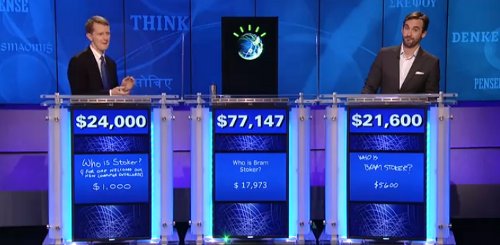[youtube]FC3IryWr4c8[/youtube]
“Danger, Will Robinson!” Attention, science fiction writers, time to find new material. Reality has arrived. In the form of a supercomputer named Watson. Most Techlife readers probably heard about the Jeopardy! match between Ken Jennings and Brad Rutter, two of the game show’s all time champions and a machine built by IBM named Watson after the founder of the company.
Since there have been science fiction storytellers, there have been sidekicks and stars, villains and heroes, useful and funny characters who were created by humans but took on a life of their own. What made these characters so endearing was not their intelligence which was often portrayed as super human, but their inability to “get it.”
In Star Wars, when C-3PO mistakenly understands his owner Luke Skywalker is being crushed by the garbage compacter, but in reality Luke is cheering loudly at being saved and is happy.
In Terminator 2:Judgement Day, when John Connor attempts to explain how to lighten up and joke to a cyborg, who is able to mimic but not truly get the human idea of a joke.
On three consecutive days in February 2011, Watson, a computer competed and crushed two of the best Jeopardy! human contestants of all time. Ken Jenning’s even joked in Final Jeopardy with the famous meme quote, “I for one welcome our new computer overlords.” (from The Simpsons “Deep Space Homer”)
What is Watson?
Simply a computer with a focused problem to solve. The ability to answer questions posed by anyone. At first this seems relatively easy until you begin to dissect the vast knowledge humans have amassed, and even more so the sinews of connection between something that we know and something we are trying to process in a new way. As an example asked today, “What do they sell at the Apple store?” Most 5 year olds in the civilized world, will answer “iPods, iPhones and Macs.” 25 years ago most 5 year olds would say, “Apples.” Both answers are right, in the context of time.
To be able to understand a question, the programming team had to take into account millions of variables of this type. To assist them they begin feeding Watson with data. At the time of the match Watson had 200 million pages of information and was not online during Jeopardy! Watson itself is housed on 90 high end IBM servers with nearly 3,000 processors.
What now Watson?
Speed is the killer factor in computing. People write into Techlife asking how do I make my PC faster. The number one answer I give people, add more RAM. IBM added more RAM, than repeated until they had 16 terabytes. (1000 gigabytes) I venture to say most readers don’t have more than 2 terabytes of hard drive storage, and this was RAM, the fast stuff. So now Watson moves the tassel of graduation to the right and starts careers — with an s. First up, and fitting is Dr. Watson to aid in patient diagnosis. Next Watson’s employer might be legal eagles using the brainpower as a research computer. And of course Five Star General Watson, as IBM counts the U.S. government as a big client, where Watson will be asked to do who knows what.
What would you do with Watson at your beck and call? Share with me.
